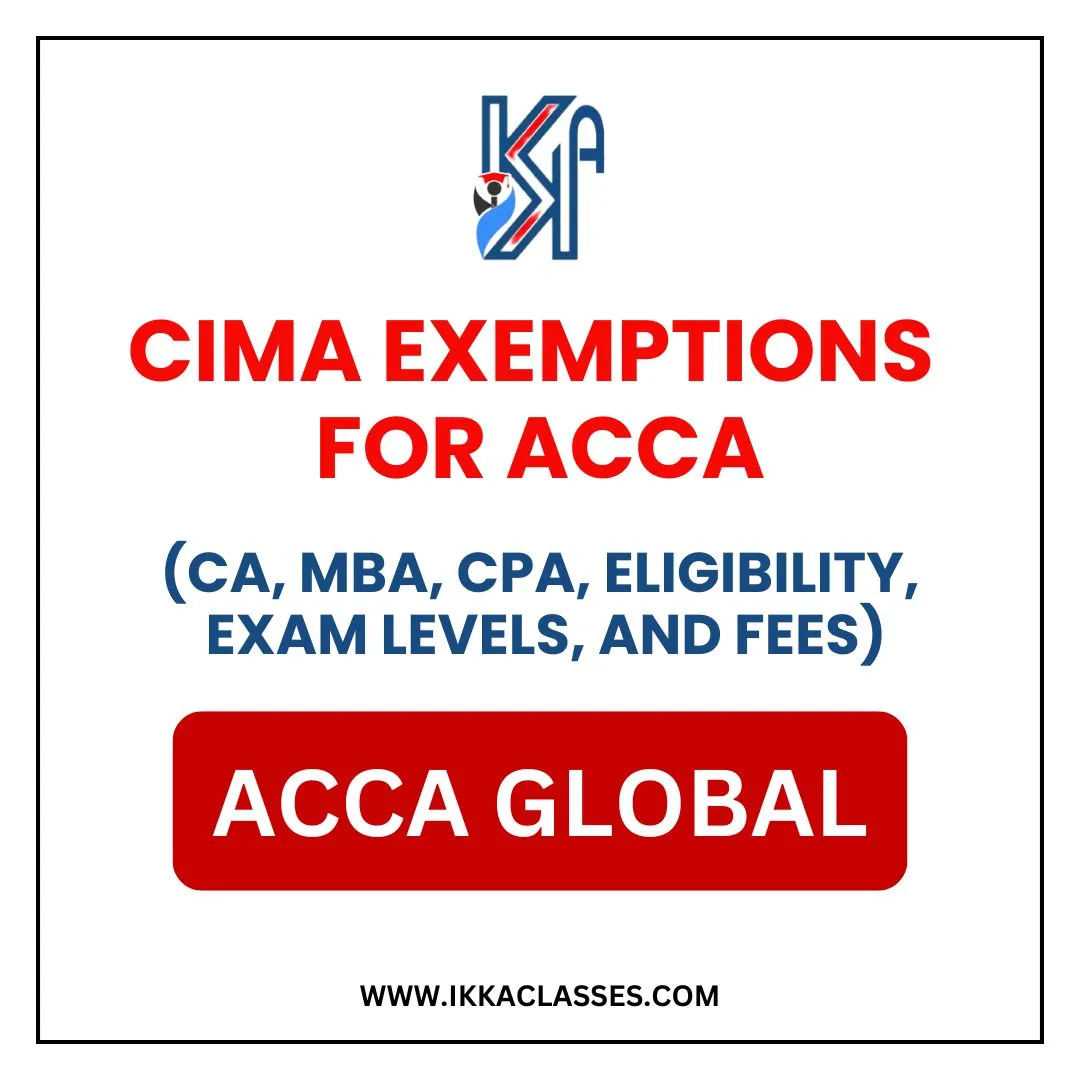So you’ve spent years grinding through your ACCA exams, and now you’re eyeing CIMA. Good news: you won’t have to start from scratch. CIMA exemptions for ACCA qualified members exist, and they’re pretty generous.
Here’s the thing, most people don’t realise—CIMA after ACCA isn’t about redoing everything you’ve already learnt. It’s about building on what you know and adding management accounting expertise to your skill set. But only if you claim your exemptions correctly.
The problem? Most ACCA members either don’t know which papers they’re exempt from, or they mess up the application process and lose time. This guide walks you through everything—which exams you can skip, how to claim exemptions, what it costs, and how to avoid the common mistakes that delay your qualification.
Let’s break it down.
Table of Contents
ToggleCIMA Exemptions For ACCA
If you’re ACCA-qualified, CIMA recognises your hard work. Instead of making you sit through exams covering similar ground, they offer exemptions that let you skip straight to advanced levels.
How it works:
You get full exemptions at three levels—Certificate, Operational, and Management. That means you bypass nine papers and jump directly to the Strategic level. You’re not starting over; you’re picking up where ACCA left off.
Why this matters:
Time matters. Each CIMA level takes months to complete. With CIMA exemptions after ACCA, you cut that down significantly. Instead of spending 3-4 years completing the entire qualification, you focus only on strategic management accounting—the stuff ACCA doesn’t cover in depth.
Plus, you save money. Fewer exams mean fewer exam fees, fewer study materials, and less time off work for preparation.
So, how many exemptions in CIMA after ACCA?
Well, here’s what you’re skipping:
Level | Papers Exempted | What It Covers |
Certificate | All papers (BA1, BA2, BA3, BA4) | Business fundamentals |
Operational | All papers (E1, P1, F1) | Operational-level finance, performance, and management |
Management | All papers (E2, P2, F2) | Management-level decision-making and reporting |
After claiming these exemptions, you’ll register directly at the Strategic level and sit for the Strategic Case Study exam.
Which CIMA Papers Are Exempted After Completing ACCA?
Let’s get specific. CIMA course exemptions for ACCA members cover these papers:
Certificate Level (Fully exempt):
- BA1 – Fundamentals of Business Economics
- BA2 – Fundamentals of Management Accounting
- BA3 – Fundamentals of Financial Accounting
- BA4 – Fundamentals of Ethics, Corporate Governance and Business Law
Operational Level (Fully exempt):
- E1 – Organisational Management
- P1 – Management Accounting
- F1 – Financial Reporting and Taxation
Management Level (Fully exempt):
- E2 – Managing Performance
- P2 – Advanced Management Accounting
- F2 – Advanced Financial Reporting
Strategic Level (Not exempt):
This is where you start. The first exam you’ll sit is the Strategic Case Study, which tests integrated strategic management skills. ACCA doesn’t cover this depth of strategic decision-making, so CIMA requires you to demonstrate competence here.

How To Qualify For CIMA Exemptions From ACCA?
Not everyone gets the same exemptions. Here’s what determines yours:
Eligibility criteria:
You need to be an ACCA member or affiliate to qualify for maximum exemption for CA in CIMA-style benefits (though technically, CA exemptions differ slightly—more on that later).
If you’ve only passed some ACCA papers but aren’t qualified yet, you might still get partial exemptions. However, full exemptions are reserved for ACCA-qualified professionals.
How prior learning mapping works:
CIMA compares your ACCA syllabus against theirs. Where content overlaps significantly, they grant exemptions. Since ACCA covers financial accounting, management accounting, business law, and taxation, CIMA recognises this and exempts you from equivalent papers.
Step-by-step eligibility check:
- Confirm you’re ACCA-qualified or an affiliate
- Visit the CIMA exemption calculator (we’ll cover this next)
- Select “ACCA” as your qualification body
- Review which papers you’re exempt from
- Proceed with the application
Where Can You Check Your CIMA Exemptions Using The Calculator?
But what if someone wants to check CIMA exemptions for degrees? Like, CIMA exemptions for chartered accountants or B.com and MBA holders?
Don’t guess which papers you’re exempt from. Use the official exemption calculator by CIMA to verify.
All you need to do is head to the CIMA Global website and open the exemptions section. There’s a free calculator that takes just a couple of minutes to use.
How to use it:
- Select your institution or professional body (in this case, ACCA)
- Enter your qualification details
- The calculator shows which papers you’re exempt from and which you need to sit.
All in all, it’s a handy tool if you have more than one qualification. For example, if you have CIMA exemptions for BCom or CIMA exemptions for MBA, the calculator will show that.
Pro tip: Take a quick screenshot of your results. You can refer to it later when you apply for exemptions officially.
How To Apply For CIMA Exemptions And Claim Them Successfully?
Knowing you’re eligible is one thing. Actually claiming exemptions is another. As discussed above, here is the whole process (but in detail):
Step 1: Register as a CGMA student
Go to the CIMA website and create your student account.
Step 2: Submit exemption application
Log into your CGMA account and go to exemptions. Choose ACCA as your prior designation. Upload back-up documents.
The documents you will need:
- Membership certificate from ACCA (or confirmation of affiliate status)
- Transcript with the papers you passed
- Proof of identity (passport or national identity card)
Step 3: Pay exemption fees
Yes, exemptions cost money (we’ll break down fees shortly). Your exemptions won’t activate until payment is confirmed.
Step 4: Wait for approval
CIMA generally turn exemption applications around in 2 – 4 weeks. You will receive an email confirming what papers you are exempt from
Step 5: Register for exams
Once approved, you can book your first exam.
What Are The CIMA Exemption Fees And How Much Do You Pay?
Exemptions aren’t free. CIMA charges fees per level you’re exempted from.
Current fee structure (approximate):
Level | Exemption Fee |
Certificate | £180 |
Operational | £420 |
Management | £420 |

Do CIMA Exemptions Expire Or Have A Validity Period?
Short answer: No, CIMA exemptions do not expire from the date of approval.
However, you are required to keep your CGMA student registration active by paying your annual fees. If you do not do that, you will need to re-register, which may delay your progress.
Important tip: You won’t lose eligibility if you apply later after becoming ACCA-qualified, but applying early helps you start your Strategic level studies sooner.
What Exemptions Does CIMA Offer To Chartered Accountants (CA)?
CIMA exemptions for CA members are quite similar to ACCA.
For CA India (ICAI members):
You usually get full exemptions for the Certificate, Operational, and Management levels.
For CA from other countries:
Exemptions differ slightly by region. Like, there are no CIMA exemptions for cpa usa. But CA Australia (CAANZ) members get certificate level and some operational-level papers as a bypass. So, it’s better to check while applying.
What Exemptions Does CIMA Offer For CMA (India And USA)?
CIMA exemptions for CMA India:
If you’re a Cost and Management Accountant accredited by ICMAI (Institute of Cost Accountants of India), you get exemptions at least to the Management level. So, effectively, CIMA after CMA India has an analogous route to ACCA. You would need to start from the Strategic level.
CIMA exemptions for CMA USA:
CIMA exemptions for IMA (Institute of Management Accountants) CMA USA members generally include the following:
- Full exemptions at Certificate and Operational levels
- Partial exemptions at Management level
You may have to sit one or two papers, at the Management level, prior to proceeding to Strategic level. Check the exemption calculator for specifics.
What Exemptions Does CIMA Provide For MBA, MCom, And Other Master’s Degrees?
CIMA exemptions for CA, BCom, MCom, and MBA are as follows:
Qualification | Exemptions Granted |
MBA (General) | Certificate level only |
MBA Finance | Certificate level only |
BCom | Certificate level only |
MCom / MSc Accounting | Certificate level (sometimes Operational too) |
What Are The Benefits Of Claiming CIMA Exemptions Early?
Time-saving
Each CIMA level takes 6-12 months to complete. Claiming exemptions cuts your total study time by more than half. You focus only on strategic management accounting instead of revisiting basics.
Quick Progression
CIMA helps you to pursue senior finance roles such as CFO, Financial Planning and Analysis Director, or Management Accountant. The sooner you earn the CGMA designation, the sooner you will have the opportunity to pursue one of these positions.
Career Advantage
Early exemptions let you focus on strategic areas that add real value to your career and help you move up faster.
Cost efficiency
Exemption fees are upfront, but they’re cheaper than paying for nine separate exams, revision courses, and study materials. You’re also earning while studying instead of taking extended breaks.
What Are The Common Mistakes When Applying For CIMA Exemptions?
- Submitting incomplete documents – To avail CIMA exemptions, you need to submit membership certificate, module transcripts, and more. Also, if you degree is not in English, you need to submit certified translations of all documents. If you fail to do that, your application will not be submitted.
- Incorrect format of uploading – Many students are not able to move to the next page of form because they are stuck with image uploading. Read carefully the format and maximum & minimum size of image. Is it .jpg or .png?
- Paying fees late – Some candidates apply for exemptions but delay payment, assuming approval happens first. It doesn’t. No payment means no processing.
- Registering for wrong exams – Claiming exemptions but accidentally registering for exempted papers anyway? Well, you can’t get refunds for exam fees once paid. Always wait for approval from the official CIMA team and then apply.
Frequently Asked Questions About CIMA Exemptions For ACCA
If you are ACCA qualified, you can avail all four papers of CIMA’s certificate level, three operational level exams, and three management level exams as exemptions.
To apply for CIMA course exemptions, you must visit the official CIMA portal. There, you need to register as a CGMA student and submit your exemption application with supporting documents (ACCA certificate, transcripts).

